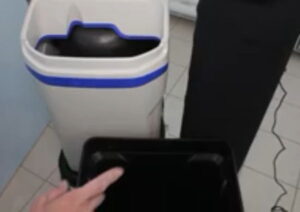Sputtering, coughing faucets, irregular water flow, hiccups in water, and vibration or sounds in your water pipes indicate air in well water lines. Air in water lines doesn’t change water quality but it is irritating to see water coughing out of taps. Let’s investigate the common causes of air in well water lines and their solution.
1. Water Pressure Tank
The well water pressure tank maintains water pressure with the help of air. If the air setting is disturbed or the pressure tank is not running optimally, it will allow air to enter water.
Solution: Let water run for 2-3 minutes. It will automatically clear the air in water. You can also check air settings in the tank using a pressure gauge. The air pressure in the tank must be 2-3 PSI less than the cut-on setting.
2. Faulty Well Pump
The well pump may draw air along water. It is a common problem with above-ground well pumps. Submersible pumps face this issue when they go bad or water level goes below the pump inlet. Sometimes a large pump can also cause this problem.
Solution: You need to service your well pump, check its position inside the well and ensure that it is appropriately sized.
3. Loss of Water in Well
Some older wells that have a receding water level allow air to enter water lines. Air can also enter water if your well has a slow recovery rate.
Solution: The temporary solution to this problem is to lower the well pump and submerge it in the water. A permanent solution would be to increase the depth of the well to tap more water underneath. You may have to dig a new well if the aquifer your well is tapping goes dry. Water well usually lasts 40-50 years if dug deep and properly.
Read More on Dry Wells: Reasons Well Water Can Run Out[Natural, Manmade, & Maintenance]
4. Air Discharge in only Hot Water Taps
Some homeowners report that only hot water has air. It means that there is nothing wrong with your well or plumbing lines. Your water heater is the culprit here.
Solution: Flush your water heater or get it serviced. The minerals in well water deposit in the water heater and reduce water pressure. Another common problem is smelly hot water. The reason behind the sulfur smell from hot water is bacteria in well water react with the anode rod and produce hydrogen sulfide gas that smells like rotten eggs. You can fix this by replacing the anode rod in your water heater.
5. Plumbing Valves
A poorly installed or a faulty valve can also allows air to enter plumbing lines.
Solution: Check all water valves in your home. Plumbing valves last 10-20 years. However, the cheaper ones can go bad after a couple of years. Water pressure fluctuations can also reduce their lifespan.
6. Leaks in Well Piping
Leaks in the well piping allow air, sediment and dust to enter water pipes. It also allows water to leak.
Solution: Close the main water supply to your home and check the pressure gauge. If the pressure falls slowly, there is probably a leak in the plumbing system. Identifying the exact leak spot may take some time as you will have to manually check every inch of plumbing pipes in your home.
7. Presence of Gases
Some gases like methane, CO2, and hydrogen sulfide often find their way in well water due to various reasons. These gases travel along water and make your faucets sputter. Some gases like hydrogen sulfide add rotten egg smell to well water.
Solution: Get your water tested to identify which gas is present in your well water. The treatment method depends on the gas and its concentration. 
8. Faulty Water Softener
Any leaks in the water softener lets air inside water. This air travels in the plumbing pipes and this is why you often hear loud bangs when you open a water tap.
Solution: Check brine tubing, valves, inlet/outlet and housing with a sponge dipped in soapy water. Replace the particular component if you see air bubbles coming out.
9. Water Treatment Machines
Many filters such as aerators and oxidation filter rely on air pocket to oxidize contaminants like iron, methane, sulfur, and manganese. Any fault in these machines will increase the amount of air in well water.
Solution: Make sure your filters are properly installed and have no leaks. Moreover, you must maintain all your water filters and treatment systems timely and properly. The safety of your home’s water supply depends on how well the filters perform.
Removing Air from Water Pipes – A Temporary Fix
- Turn off the main water supply valve completely.
- Open all the water connections in your home. Make sure you open the water connections for your dishwasher, washing machine, and other appliances using a fixed water connection.
- Turn on the main water valve you closed before opening the faucets. Keep the faucets running for 10-15 minutes or until you a steady stream of water coming out from the taps. Wait for a couple of minutes after seeing a steady flow of water.
Also read: [Fixed] Water Well Frozen Pipes Solution & Prevention Guide
Is air in well water dangerous?
A random incident is nothing to worry about. However, frequent problems like loud bangs, sputtering faucets, and pressure fluctuation indicate something wrong with your well. The well pump may be faulty, or there are cracks in the pipe. Your filter may have gone bad. It is better to act timely and contain the damage, as replacement and repairs can cost a lot.
If the sputtering is accompanied by a change in water quality (taste, smell, and color), you must immediately test your water to find out what’s causing the problem. Sometimes the air in water or sputtering is due to gases in the water. Some of these gases are harmful and require immediate action.
What are the signs that air is present in your water pipes?
- Water pressure fluctuation
- Noisy pipes/loud banging
- Sputtering and coughing faucets
- Cloudy/gray water
- Iron in water
- Corroded or rusty pipes
What is the reason behind air in city water pipes?
Though it happens rarely, homes on city water supply can also witness air in water pipes problems. The main reasons include the following.
- Problems at the supplier’s end
- Water heater problems (if the issue is only in hot water)
- Issues with plumbing valves
- Faulty water softener/filter
